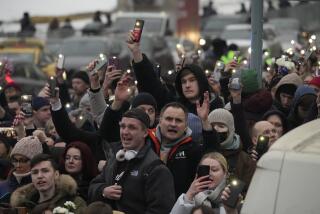NEWS ANALYSIS : Yeltsin Worked Populist Magic but No Miracle
- Share via
MOSCOW — The morning after the big vote, Boris N. Yeltsin may have felt like a man who had kissed his sister.
Proving he still can work his populist magic, Russia’s president won an unexpectedly emphatic endorsement of his leadership at the polls.
But he fell several million votes short of persuading enough fellow citizens to demand the ouster of the men and women he charges are torpedoing his reforms--Russia’s Congress of People’s Deputies and lawmakers at all other levels.
So now what? In a nutshell, the legal and constitutional result of Sunday’s Russia-wide referendum is an uneasy tie that leaves the country’s political crisis unresolved.
“The battle will continue,” Vladimir O. Boxer of the pro-Yeltsin Democratic Russia movement predicted.
But thanks to Sunday’s vote, Boxer said, there is a new twist--one he welcomes.
“Before, the deputies tried to pretend that the people were behind them,” Boxer said. “Now it is clear that’s not true. It is clear the people are behind Yeltsin.”
Making the suspense about post-referendum developments sharper, Russia’s 62-year-old president stayed out of sight all day Monday as allies and enemies tried to predict his next move. The conservative-led Supreme Soviet, Russia’s standing legislature drawn from the ranks of the Congress of People’s Deputies, is scheduled to convene today.
Ignoring Russia’s 1978 Soviet-era constitution, pro-Yeltsin politicians urged that he take action to seize a mandate they see as no less decisive than the hero’s aura he won in resisting the August, 1991, hard-line Communist putsch.
But as election officials continued to tally referendum returns across Russia, it was far from obvious how Yeltsin can apply what appears to be a qualified victory (and certainly no landslide given the relatively modest voter turnout) to the half-Soviet, half-democratic hybrid political system.
“It doesn’t actually matter in terms of his constitutional powers how many people cast their votes for Yeltsin. He won’t get any more powers to allow him to step outside the constitution,” said Communist lawmaker Vladimir B. Isakov, a leader of the anti-Yeltsin National Salvation Front.
Complicating the Russian chief executive’s strategy, leaders of the two other branches of power made it clear that they will not give him carte blanche.
“Even if 100% vote for trust in the president, he has no right to make unilateral constitutional changes,” Constitutional Court Chairman Valery D. Zorkin said.
Yeltsin had claimed that a vote in his favor would be interpreted as an endorsement of a new, post-Communist constitution of Russia, key clauses of which were published only last Friday.
But Zorkin, who heads the tribunal that judges what is constitutional, laughed off that assertion.
“Expression of support in the president will not signify approval of the text of a new constitution that no one has seen yet,” the judge said Sunday.
A dissatisfied Ruslan I. Khasbulatov, chairman of Parliament and the president’s archfoe, told leaders of the Supreme Soviet on Monday that Yeltsin’s team had waged a campaign in the style of Adolf Hitler’s propaganda chief, Joseph Goebbels, to bamboozle voters.
Other deputies were outspokenly alarmist. Veniamin S. Sokolov, chairman of one of the Supreme Soviet’s chambers, predicted that Yeltsin will now attempt unspecified “unconstitutional steps.”
If that happens, Sokolov warned, the Congress, which is empowered to remove Yeltsin, will convene in emergency session.
Even while there was triumph in the Yeltsin camp Monday, it was of a half-a-loaf variety. “The president will take this victory as a show of support for his constitution,” said Sergei Karaganov, a member of Yeltsin’s Presidential Council. But he predicted a “very long, hard, tedious process” to bring it into force.
One solution, Karaganov said, would be trying to pass an interim “constitutional law” that would temporarily bring into being the kind of government Yeltsin wants (a presidential republic with a two-house legislature) while the text of a new constitution is debated.
But Karaganov admitted that would be a tough sell in the Parliament dominated by Khasbulatov and his cronies. Another option, he said, is yet another nationwide plebiscite on the constitution itself.
At any rate, Karaganov predicted that in the next few months, “there will be a lot of give and take.”
Writing in the English-language Moscow Times, Russian editor Nikolai Andreyev predicted that Yeltsin will now move to re-establish the authority of his executive branch over local legislatures, which are often Communist-controlled, and prepare for new parliamentary elections.
“Yeltsin intends to act quickly and decisively and to have new elections this year,” Andreyev said.
The editor predicted a “desperate” counterattack by Khasbulatov and his forces--possibly including another special session this week of the Congress, which tried but failed to oust Yeltsin from office last month.
Whether or not members of Congress will feel intimidated by voter support for Yeltsin is an open question. Many opposition leaders, including Isakov, who commented on referendum results Monday, clearly do not.
Deputy Sergei N. Yushenkov said he and other Yeltsin supporters in Congress expect “more resolute steps” from the president, including firmer measures to stabilize the country’s finances and halt a dizzying decline in value of the ruble, more effective privatization of state property and support for entrepreneurs.
Pro-Yeltsin deputies also made it clear that they will press their colleagues to resign from five-year terms they won in 1990 and run again for office.
More to Read
Sign up for Essential California
The most important California stories and recommendations in your inbox every morning.
You may occasionally receive promotional content from the Los Angeles Times.













